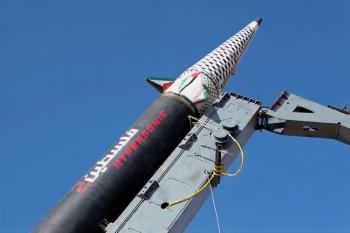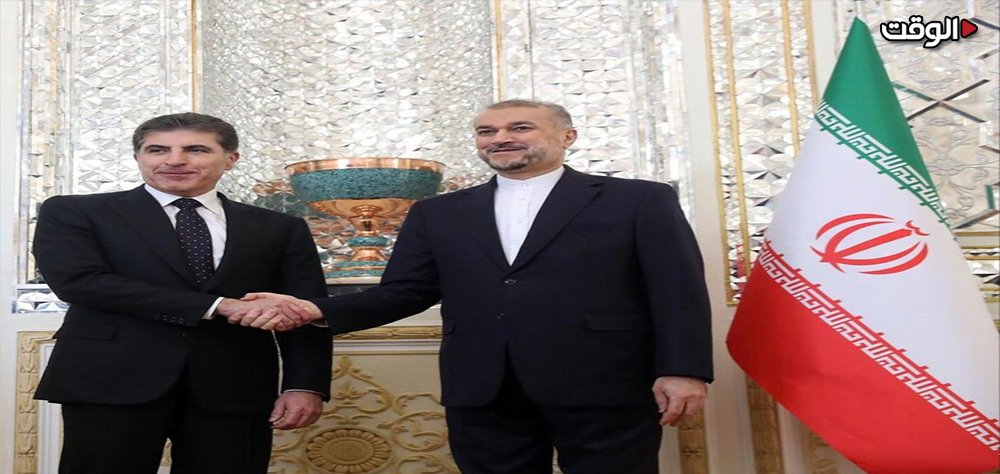Alwaght- Iraqi Kurdistan region's President Nechervan Barzani on Sunday arrived in Tehran heading a high-ranking delegation. He met with top Iranian officials including President Seyyed Ibrahim Raisi, Parliament Speaker Mohamed Baqer Qalibaf, and Foreign Minister Hossein Amir-Abdollahian.
This visit is very important since it takes place in the midst of Erbil's efforts to gain assurance from Iran in dealing with the security and political challenges affecting the region.
In his meeting with Barzani, President Raisi described Iranian relations with Kurdistan region as based on historical, national, religious, and cultural pillars, adding that this visit will mark a turning point in boosting the political, security, economic, and cultural relations between Tehran and Erbil.
Appreciating the role of General Qassem Soleimani, the Iranian anti-terror commander who was assassinated by the US in Iraq in 2020, in the security and survival of Kurdistan, Barzani held that the basis of the new Iraq and today's relations are the result of the "blessed cooperation between Iran and Iraq, and therefore "Iran is not just a neighbor for us. If it were not for the Islamic Revolution and the Islamic Republic, it would not be known what the fate of the Kurdish movement would be today. Respecting this partnership and interaction is a red line that we will never cross."
This visit took place after Barzani's recent talks in Baghdad with Iraqi Prime Minister Mohammad Shia al-Sudani and pro-Iranian political parties in the ruling parliamentary bloc the Shiite Coordination Framework (SCF) at a critical juncture for the Kurdistan region. Political experts believe that Barzani's consultations with senior Iranian officials show the will of both sides to strengthen bilateral relations and can draw a new landscape for the expansion of bilateral cooperation.
Strengthening bilateral ties
Though Barzani has visited Iran with a set of security and political objectives, meanwhile, Iran seeks its own goals behind this visit and wants to share them with Erbil leaders.
Apart from the consolidation of political ties, which has always been a priority for Tehran and Erbil, the two sides have always had the necessary determination to develop economic cooperation, an approach that has faced problems in recent months following tensions in their relations. In such a situation, it seems that paving the way for broader economic cooperation between Iran and the autonomous region will be one of the most important agendas of Barzani's talks in Tehran.
With regard to long borders and several border crossings, if the two sides bolster their trade ties, the economic challenges the people of border regions on both sides of the border are struggling with, especially the kolbars (cross-border workers), will largely disappear. Establishing border markets can be effective to this end.
"Iran sees no obstacle to expand economic cooperation and trade relations with the Kurdistan region. We consider the long borders between the two sides as a valuable opportunity to improve the level of relations, but security is the basis and necessary platform for any kind of cooperation and expansion of interactions," Raisi told Barzani.
Also the two sides discussed facilitation of worshipping travels as the Ashura and Arbaeen marches are approaching.
To facilitate Iranian travels to Iraq for Ashura, the Kurdish authorities over the past two years have boosted capacity of the border crossings, allowing hundreds of thousands of Iranians traveling to the holy city of Karbala through the Kurdistan region. Erbil every year expands capacity of reception of Iranian worshipers and this takes expansion of political ties to remove the hurdles and facilitate the travels.
This visit is important as we know that over the past two years, Tehran-Erbil relationship has been stricken by political and security tensions following a series of developments. Due to threats posed by the separatist groups based in the Kurdistan region, Iran several times attacked the positions of these terrorist groups and warned the Kurdish leaders about the consequences of the presence of separatist elements on their soil. These warnings finally led to the signing of a security agreement between Tehran and Baghdad, and the separatist groups were forced away from some of their positions, but still the threat of these groups against Iran's territorial integrity remains standing, and therefore, Islamic Republic is trying to enhance security on the borders through consolidating security and political relations with Erbil.
Investigations show that despite the measures taken by Kurdish authorities to counter the destabilizing actions of terrorist groups, these measures are far from reaching the desired point and as long as some regional authorities support the separatists, providing security on both sides of the borders will not be achieved. Iran expects the Erbil authorities to implement the security agreement as soon as possible and treat the challenges by removing the separatist groups from Iran's borders.
Another issue is the presence in Kurdistan of Mossad spies, who in recent years have posed threats to Iran's territorial integrity and national interests along with terrorist groups. In order to eliminate them, Iran has carried out several missile attacks on their positions in Erbil and other Kurdish areas and warned the leaders of the ruling Kurdistan Democratic Party to end the presence of these known elements on Iran's borders. These issues were highlighted in Raisi's meeting with Barzani.
"We are confident about the goodwill and friendship of our Iraqi and Kurdish brothers, but considering the hatred of the enemies, including the Zionist regime, to the Iranian nation, we expect the governments of Iraq and the Kurdistan region to absolutely prevent any abuse of the region's soil by the elements of the Zionist enemy and anti-revolutionary elements to act against Iran," Raisi said.
What does Barzani seek in Tehran?
Erbil officials have relatively mentioned the goals of Barzani in Tehran, saying that political issues are top on his agenda.
Nazem Dabagh, Kurdistan region's envoy to Iran, commented on Barzani's travel to Tehran, saying: "The president of Kurdistan region has visited Tehran with the aim of discussing the most important issues of the region and expanding bilateral relations with Iran."
Delshad Shehab, the spokesman to the Kurdistan Regional Government (KRG), said: "Since the beginning of the fall of the dictatorship [of Saddam Hussein], there have been friendly relations with Iran based on mutual respect, which have preserved the interests of both sides, and the president of the region wants to assure our friends in Tehran that the region will maintain this position as a factor of stability and will not become a threat to the interests of the neighbors."
These marginal goals have many details in their heart that bring Barzani to Tehran. It should be mentioned that Iraqi Kurdistan is divided between the two key parties of Kurdistan Democratic Party (KDP) and Patriotic Union of Kurdistan (PUK). The PUK, led by Bafel Talabani with its stronghold being Suleimaniya, holds the two provinces of Suleimaniya and Halabja. The bastion of the KDP is the capital Erbil, and the party holds the two provinces of Erbil and Duhok that start from north of Suleimaniya to the Turkish border. The two parties struggle for influence in other areas, and armed clashes are common between them.
In recent years, the political tensions between the two leading parties of the region have increased, and there is even a heavy competition between the two over taking more seats in the local parliament, to the extent that the Barzani government, fearing to lose its seats, has postponed the elections several times, drawing strong reactions from the PUK leaders. In this regard, Jabar Yavar, a member of the leadership council of the PUK, told the Arab Press news outlet that the internal political disputes of Kurdistan will be on the agenda of Barzani in Tehran.
A Kurdish source told the London-based Asharq Al-Awsat newspaper that Barzani will ask Tehran to put pressure on its ally, the PUK, to agree to postponing the elections. The source said Barzani's visit was part of an effort by the KDP to delay the election in order to have time to introduce amendments to Federal Supreme Court's rulings on minority quotas and the body that would oversee them.
After delays driven by disputes between the two parties over political issues and the pending legal cases about the regional elections, Erbil was set to hold an election on June 10 after a two-year delay. The KDP wants another delay, but PUK, which is known for its warn relations with Tehran, is opposed to the idea.
The leaders of the PUK have warned that the postponement of the vote could lead to the split of the region into two governments. So, Barzani is trying to find a solution to settle the political crisis with the help of Tehran.
Another important point is energy which is of significance to the Iraqi Kurdistan leaders. There are unfolding disputes between Erbil and the central government over oil and gas exports of Erbil government. The KDP is seeking to end this political and energy dispute with Baghdad through Iranian mediation and secure a pathway for energy exports, as revenues are crucial to keep the region's economy afloat.
In some experts' viewpoint, amid the many unsettled issues between Erbil and Baghdad, including the oil exports, disputed regions, and employee salaries, Erbil is taking advantage of firm Iranian relations with Iraq, and using these warm ties can find ways to solve the chronic challenges. The developments between the two sides provide a basis to boost ties and joint efforts in various areas.
Also, in recent months, local media reported a missile attack on Kurmor gas and oilfield in Suleimaniya that disrupted fuel supplies in this province for days. This issue has been worrisome to Erbil leaders who believe that the attacks are carried out by Iraqi resistance groups. Barzani intends to use Iran's influence to prevent future similar attack and secure stability of the Kurdistan region.



























